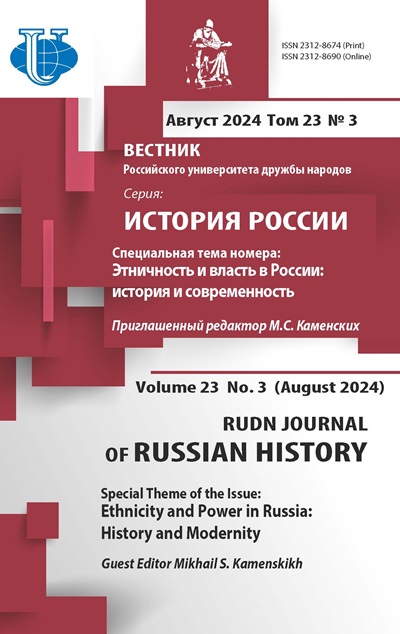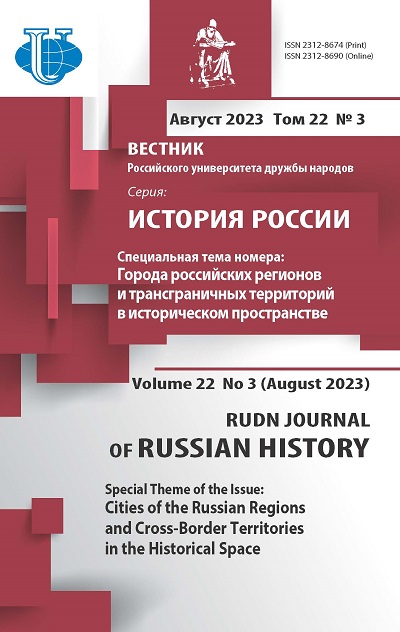Defensive Social Practices in the History of Russia: the Early Formation of “Cancel Culture” or a Rare Event of the Past?
- Authors: Mogilevskiy N.A.1, Skizhenok A.V.1, Chernikova T.V.1
-
Affiliations:
- MGIMO University
- Issue: Vol 22, No 3 (2023): Cities of the Russian Regions and Cross-Border Territories in the Historical Space
- Pages: 470-483
- Section: ARTICLES
- URL: https://journals.rudn.ru/russian-history/article/view/36009
- DOI: https://doi.org/10.22363/2312-8674-2023-22-3-470-483
- EDN: https://elibrary.ru/VDBQPI
Cite item
Full text / tables, figures
Abstract
While the concept of “cancel culture” is already a given in contemporary culture; through this article, the authors propose to illustrate a comparable concept/term “defensive practice” in a broader historical retrospective. The authors emphasize that in general there were relative few examples of such “defensive practices” in Russian history, but analyzes the two earliest of them. The first is at the end of the XVII century, when a conflict broke out between the religious and political groups of “Latinisers” and “Graecophils.” Patriarch Joachim played an active role in resolving the conflict by unequivocally taking the side of the “Graecophils.” As a result, the writings of “latinising heretics” were banned, and they were either executed or condemned by the local council of the Russian Church. In the XVIII century manifestations of comparable defensive practice became even rarer, but already at the very end of the century, under Emperor Paul I, the highest authorities again re-used this technique. Fearing the spread of revolutionary “contagion,” Paul I set the goal of banning the spread of “French fashions” in Russia, individual French words, as well as writings by French authors (or those who sympathized with the events of the French Revolution). However, all these measures had no effect and were eventually ended under Alexander I. As a result, the authors come to the conclusion that at the initial stage of the Modern era and even in the XVIII century, practices comparable to modern cancel culture were not widespread in Russian life, and were an exception rather than socio-political practice.
About the authors
Nikolay A. Mogilevskiy
MGIMO University
Email: n.mogilevskii@inno.mgimo.ru
ORCID iD: 0000-0003-3186-6256
Dr. Habil. Hist., PhD in History, Ass. Professor of the Department of World and Domestic History
76, Prospekt Vernadskogo, Moscow, 119454, RussiaAlexey V. Skizhenok
MGIMO University
Author for correspondence.
Email: francealex8@gmail.com
ORCID iD: 0000-0003-0624-6258
PhD in History, Senior Lecturer of the Department of World and Domestic History
76, Prospekt Vernadskogo, Moscow, 119454, RussiaTatiana V. Chernikova
MGIMO University
Email: tchernikova1961@mail.ru
Dr. Habil. Hist., Professor of the Department of World and Domestic History 76, Prospekt Vernadskogo, Moscow, 119454, Russia
References
- Barsukov, I.P. Vserossiiskii patriarkh Ioakim (Savelov) [All-Russian Patriarch Joachim (Savelov)]. St. Petersburg: O-vo Liubitelei dukhovnogo prosveshcheniia Publ., 1891 (in Russian).
- Bussov, K. Moskovskaia khronika 1584-1613 gg. [Moscow Chronicle 1584-1613]. Moscow; Leningrad: Izd-vo Akad. nauk SSSR Publ., 1961 (in Russian).
- Eidelman, N.Ia. Gran' vekov. Sekretnaia dinastiia [Edge of the ages. Secret dynasty]. Moscow: Vagrius Publ., 2008 (in Russian).
- Gavrilov, A.V. Literaturnye trudy patriarkha Ioakima [Literary works of Patriarch Joachim]. St. Petersburg: Strannik Publ., 1872 (in Russian).
- Geno, A., Tomich. Pavel I. Sobranie anekdotov i otzyvov, kharakteristik, ukazov i proch [Pavel I. Collection of anecdotes and reviews, characteristics, decrees, etc.]. St. Petersburg: Sinodal'naia tipografiia Pabl., 1901 (in Russian).
- Golubtsov, A.P. Preniia o vere, vyzvannye delom korolevicha Val'demara i tsarevny Iriny Mikhailovny [The Debate on Faith Caused by the Case of Prince Valdemar and Princess Irina Mikhailovna]. Moscow: Tip. A.I. Snegirevoi Publ., 1891 (in Russian).
- Karatygin, P.P. “Tsenzura vremen imperatora Pavla I. 1796-1801 [Censorship under Emperor Paul I. 1796-1801].” Istoricheskii vestnik 22, no. 10 (1885): 151-160 (in Russian).
- Klochkov, M.V. Ocherki pravitel'stvennoi deiatel'nosti vremeni Pavla I [Essays on government activities of the time of Paul I]. Petrograd: Senatskaia tipografiia Publ., 1916 (in Russian).
- Preobrazhenskii, A.A., Morozova L.E., and Demidova, N.F. Pervye Romanovy na rossiiskom prestole [The first Romanovs on the Russian throne]. Moscow: IRI Publ., 2007 (in Russian).
- Shilder, N.K. Imperator Pavel I [Emperor Pavel I]. Moscow: Veche Publ., 2009 (in Russian).
- Shliapkin, I.A. Sv. Dimitrii Rostovskii i ego vremia (1651-1709 g.) [St. Demetrius of Rostov and his time (1651-1709)]. St. Petersburg: A. Transhel' Publ., 1891 (in Russian).
- Smirnov, P.A. Ioakim, patriarkh Moskovskii [Joachim, Patriarch of Moscow]. Moscow: L.F. Snegireva Publ., 1885 (in Russian).
- Zenkovskii, S.A. Russkoe staroobriadchestvo: Dukhovnye dvizheniia XVII veka [Russian Old Believers: Spiritual movements of the 17th century]. Moscow: Tserkov' Publ., 1995 (in Russian).
















